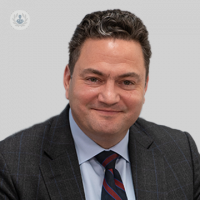How to recover from hip surgery
Written in association with:Recovery from hip replacement surgery may depend on a number of factors. These include the patient's age, their health pre-operation, the type of procedure used during surgery and the level of aftercare with physiotherapy. We’ve asked consultant orthopaedic surgeon Mr Dean Michael for his expert advice on recovery from hip surgery.

Does recovery after a hip replacement vary by age?
Recovery after hip replacement does vary slightly according to age, but rather than age alone it's more related to the level of activity and the muscle strength of the patient before their operation.
Younger or more active patients tend to return to normal function a bit more quickly. If patients delay their procedure to the point where their hip joint is very stiff and restricted in terms of activity, the results post-surgery aren't quite as good. They would have been better if they had their operation at the point in which their muscles and joint were a little bit stronger and more mobile.
Does recovery depend on the operation?
Some evidence suggests that recovery following hip replacement varies according to the type of surgical approach that is used. Postoperative recovery can vary depending on whether a cemented or uncemented implant is used.
With cemented implants, patients tend to be able to move fully weight-bearing straight away. Whilst in the case of uncemented implants, we may suggest to the patient that they protect their weight-bearing with crutches for a few weeks postoperatively.
There is a lot of research regarding the different surgical approaches that surgeons may use. There is a lot of information on the internet about mini-incision approaches and the anterior approach, which has had a lot of press coverage recently.
There is no evidence to suggest that in the long term the surgical approach changes the outcome of the hip replacements and overall the results are brilliant. However, with mini-incision approaches, whether it be the mini-posterior approach or the anterior approach, the initial recovery for the patient can be improved. Those patients seem to be able to get mobile a bit more quickly and return to activity within the first six weeks.
What care should patients have immediately after the operation?
In the very early stages of recovery whilst in hospital, the nursing staff and physiotherapy staff will help the patient cope with the immediate requirements of self-care. They will be taught how to get in and out of bed, how to wash and how to start walking initially with a frame and then crutches. When the patient is confident doing all of these things and being able to climb stairs with the aid of the crutches, they will then be deemed fit to go home.
During recovery at home, they should think about getting some provision of help with things like shopping, cooking major meals and cleaning the house. For the first week or two, these things are important. As time passes, they'll certainly be able to undertake more of these activities independently.
Why is a physiotherapy program important in recovery?
Physiotherapy is vital in getting the patient back to full activity and function. A lot of the requirements of physiotherapy depend on the state of the patient before their operation. If patients have suffered from severe arthritis pain and restricted movement for a long time, the muscles are very weak and the joint is very stiff.
Following surgery, it is a battle for the patient to regain their normal and optimal muscle strength with the help of a physiotherapist. We find that patients who really engage in a program, return to normal function more quickly. Returning to sports physiotherapy and maximising the muscle strength is really important in these sorts of scenarios.
What hinders recovery from being successful?
In the early stages of the postoperative recovery, the things that tend to slow patients down are problems such as nausea, drowsiness and constipation. These are often associated side effects of some painkillers that we use postoperatively.
There is always a difficult balance between providing the right amount of pain relief, which enables the patient to get mobile, but without the side effects as seen with modern anaesthetic techniques and some painkillers. We limit the use of morphine-like drugs, which seem to have more side effects that hinder recovery.
Later on, patients suffer from problems as a result of their muscle weakness and stiffness that they developed as part of their arthritic process. In this sort of scenario, physiotherapy pre-operation can help to improve the range of movement to the joint. This maximises muscle strength, which certainly helps recovery in the early stages.
The other thing that we find often slows patients down is a lack of confidence. This is particularly relevant in elderly patients who have had arthritic symptoms for a long period of time. They find their mobility is slowly reduced and physiotherapy is really important to not only improve their muscle strength but for regular feedback and encouragement from the physiotherapists. It really helps them to maximise their function and return to normal as quickly as possible.
Do not hesitate to book a first consultation with Mr Dean Michael if you're concerned about your hip pain.



